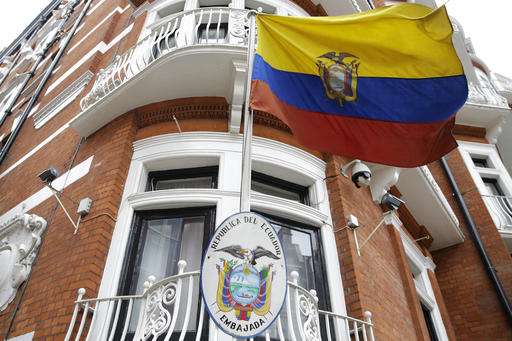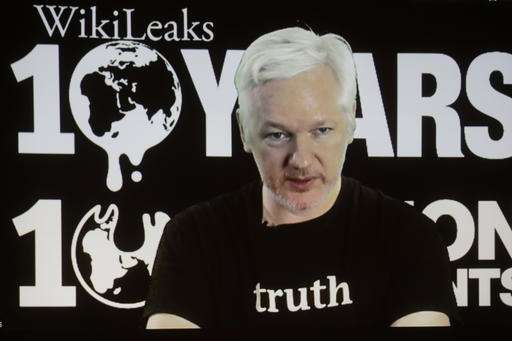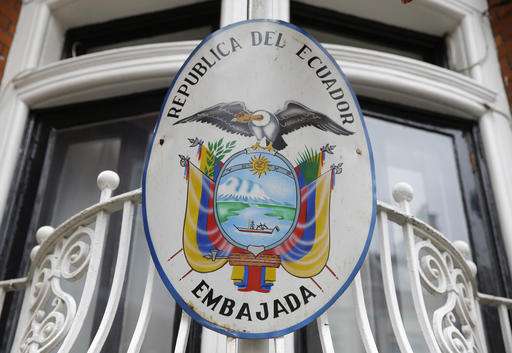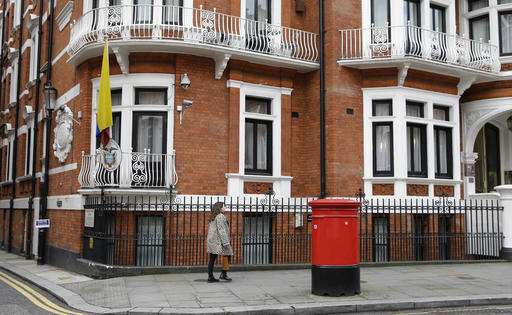Mystery swirls around Assange's status at Ecuadorean Embassy

Midway through releasing a series of damaging disclosures about U.S. presidential contender Hillary Clinton, WikiLeaks founder Julian Assange says his hosts at the Ecuadorean Embassy in London abruptly cut him off from the internet.
The news adds another layer of intrigue to a campaign that has been roiled by dramatic leaks and allegations of state-sponsored subversion.
"We can confirm Ecuador cut off Assange's internet access Saturday, 5pm GMT, shortly after publication of Clinton's Goldman Sachs (speeches)," the group said in a message posted to Twitter late Monday. In follow-up messages posted Tuesday, the group claimed U.S. Secretary of State John Kerry had personally intervened to ask Ecuador to stop Assange from publishing documents about Clinton. Citing "multiple US sources," WikiLeaks said the request was made on the sidelines of negotiations which took place last month in Colombia.
The State Department denied the allegation.
"While our concerns about Wikileaks are longstanding, any suggestion that Secretary Kerry or the State Department were involved in shutting down Wikileaks is false," U.S. State Department spokesman John Kirby said in an email. Speaking to reporters later, deputy spokesman Mark Toner said Kerry never even raised the issue or met with Ecuadorean President Rafael Correa during his visit to Colombia.

"There just was no meeting," he said. "They didn't discuss any of this stuff."
Assange has been holed up at the modest embassy suite at No. 3 Hans Crescent for more than four years after skipping bail to avoid extradition to Sweden over sex crimes allegations, a position which—until now—hasn't prevented him from continuing to play a pivotal role in exposing state secrets and backroom trade deals.
WikiLeaks said unspecified "contingency plans" were in place and the site and its Twitter feed appeared to be working as usual. On Tuesday it released another tranche of emails from Clinton campaign chairman John Podesta, suggesting that the group's ability to publish has yet to be compromised.
The disclosure was the 11th installation in a series of leaks that have captured the workings of Clinton's inner circle and included excerpts of her well-compensated speeches to investment bank Goldman Sachs. Those leaks themselves are part of a wider cascade that have embarrassed the Democratic Party and which the American intelligence community has recently described as an attempt by the Russian government to interfere in the U.S. election.
Staff at WikiLeaks and the embassy either declined comment or didn't return messages. Ecuador's Foreign Minister Guillaume Long, approached by The Associated Press on the sidelines of a United Nations conference in Quito on Monday, declined to comment when asked about Assange. His office later released a terse statement in response to "the speculation of the last few hours" reaffirming Assange's asylum status and saying that "his protection by the Ecuadorean state will continue while the circumstances that led to the granting of asylum remain."

The statement made no mention of Assange's internet access.
Assange fled to the Ecuadorean Embassy on June 19, 2012, after a drawn-out and ultimately unsuccessful legal battle to being sent to Sweden, where he remains wanted over an allegation of rape. Ecuador granted him asylum, but British authorities have made clear they would arrest him if he tried to leave. London's Metropolitan Police used to maintain a visible presence outside the building, although officers were nowhere in sight when an AP journalist visited on Tuesday.
Assange has carved out a life at Hans Crescent, dining on delivered food, welcoming famous well-wishers and even occasionally addressing the media from the embassy's balcony. But evidence mutual suspicion with his hosts surfaced after BuzzFeed News drew on leaked documents to detail tensions between Assange and Ecuadorean embassy staff.
If Assange is being cut off from the internet for diplomatic reasons, it might jibe with Correa's politics. The leftist politician recently told the Moscow-backed RT broadcaster that he'd prefer Clinton over Trump.
"For the United States, I'd like the winner to be Hillary, whom I also know personally and appreciate very much," Correa said.

Marc Becker, a professor of Latin American history at Truman State University in Missouri, said that while Clinton had successfully pulled Correa into her orbit during her tenure as secretary of state, he doubted Ecuador had merely bowed to U.S. pressure. He ventured that Correa's government opposes the idea of interfering in another country's affairs "and doesn't appreciate their guests using their resources to that end."
Whatever its motive, Assange isn't likely to submit to the internet ban quietly. Over the weekend WikiLeaks released three lines of code it described as "pre-commitments," labeling them "John Kerry," ''Ecuador," and "FCO"—an apparent reference to Britain's Foreign and Commonwealth Office. Pre-commitments are cryptographic functions that can be used to verify the integrity of material released subsequently.
Thomas White, a U.K.-based security researcher and transparency activist, saw the posts as a warning to the named parties that WikiLeaks had ammunition in reserve if Ecuadorean authorities "do not continue to offer him political asylum."
© 2016 The Associated Press. All rights reserved.





















